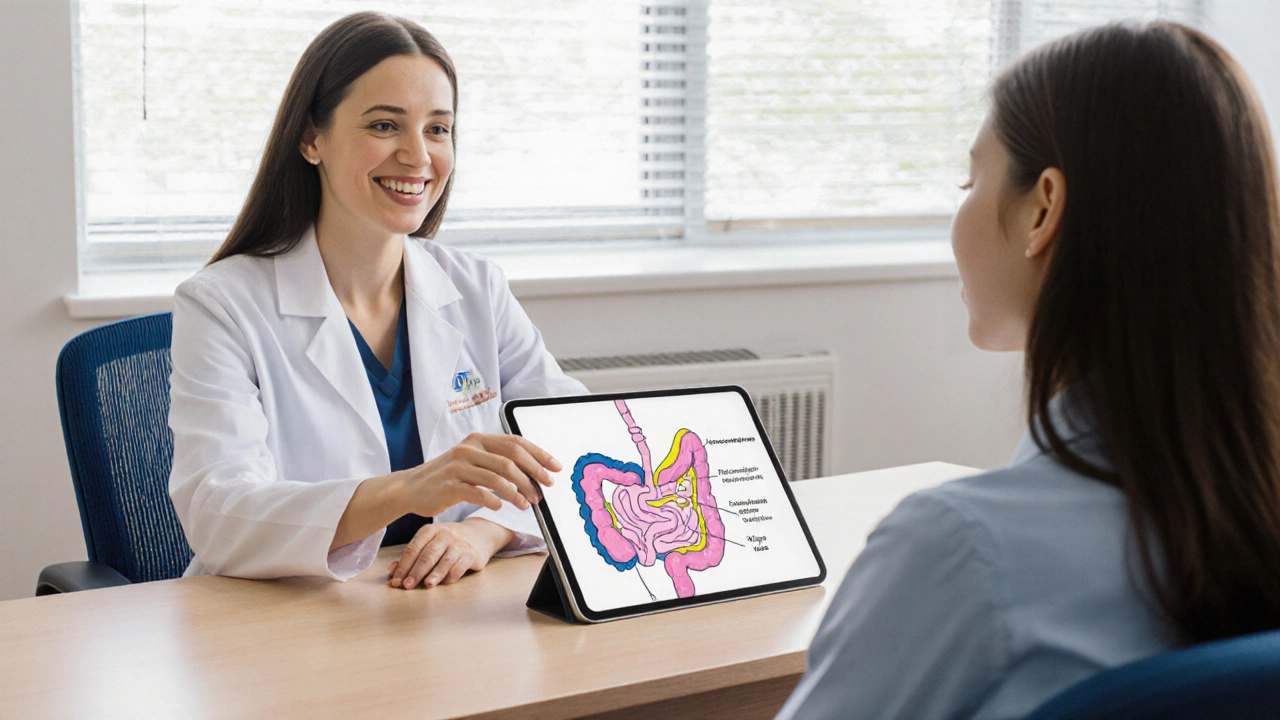Menstrual Bloating Tracker
Track your bloating symptoms and identify patterns related to your menstrual cycle.
3menstrual bloating can feel like an unexpected balloon inflating right before your period starts. It’s a common, frustrating symptom, but you don’t have to suffer in silence. Below is a quick‑hit TL;DR followed by a deep dive into why it happens and practical ways to keep the puffiness at bay.
- Hormonal swings (estrogen, progesterone, prostaglandins) slow gut motility and trap gas.
- Dietary triggers - salty foods, caffeine, and low‑fiber meals - worsen the feeling.
- Gentle movement, hydration, and probiotic‑rich foods restore balance.
- Over‑the‑counter options like NSAIDs or antispasmodics can provide short‑term relief.
- See a doctor if pain is severe, persistent, or accompanied by other red‑flag symptoms.
What Exactly Is Meteorism?
When you hear the term Meteorism is the medical word for excess gas or bloating in the digestive tract, think of an over‑filled balloon inside your belly. It’s not just harmless wind; it can stretch the intestine walls, cause cramping, and make you feel visibly swollen.
How Menstruation Connects to Bloating
Menstruation is the monthly shedding of the uterine lining accompanied by hormonal fluctuations. Those hormonal shifts have a ripple effect on the gut.
The Hormonal Trio Behind the Swell
Three key players drive the extra gas you feel during your period:
- Estrogen is a primary female sex hormone that regulates the menstrual cycle and influences water balance. In the luteal phase (the weeks leading up to your period) estrogen dips, prompting the body to retain water and slow digestion.
- Progesterone is another cycle hormone that relaxes smooth muscle, including the intestinal wall. High progesterone levels make the gut more sluggish, so food moves slower and fermented carbs produce more gas.
- Prostaglandins are lipid compounds released during menstruation that cause uterine contractions. Unfortunately, they also stimulate the colon, leading to cramping and trapped gas.
The combined effect is a slower gut, more water retention, and a higher likelihood of fermentable foods turning into gas.
Gut Microbiome: The Silent Partner
Recent research shows that Gut microbiome is the community of bacteria living in your intestines that aid digestion and immune function fluctuates with hormonal cycles. Certain bacterial strains thrive on sugar and fiber, while others produce gas as a by‑product. When estrogen drops, the balance can tilt toward gas‑producing bacteria, amplifying bloating.

Spotting the Signs: Is It Just Bloating or Something More?
- Feeling a tight, distended abdomen 1‑3 days before your period.
- Accompanying symptoms: lower‑back ache, mild cramping, or a feeling of heaviness.
- Gas that’s released with a distinct odor or after eating specific foods.
- Relief after a bowel movement or gentle exercise.
If you notice vomiting, severe pain, sudden weight loss, or blood in stool, it’s time to see a doctor-those are red‑flag signs unrelated to normal menstrual bloating.
Everyday Strategies to Beat the Puff
Below is a practical checklist you can start using today.
- Hydrate wisely: Aim for 1.8-2L of water daily. Warm water with a squeeze of lemon can stimulate gut motility.
- Watch your salt: Excess sodium forces the body to hold onto water, increasing the bloated feeling.
- Limit caffeine and carbonated drinks: Both can stimulate acid production and trap air.
- Eat fiber-rich foods: Fiber is plant‑based carbohydrate that adds bulk to stool, helping it pass more smoothly. Opt for oats, berries, and leafy greens rather than beans or cruciferous veggies right before your period.
- Include probiotic foods: Yogurt, kefir, kimchi, and sauerkraut feed good bacteria and may offset the gas‑producing shift.
- Move gently: A 20‑minute walk, prenatal yoga, or light stretching can coax the intestines back into rhythm.
- Try heat therapy: A warm belly pad for 10‑15 minutes eases muscle tension and reduces perceived bloating.
When Lifestyle Isn’t Enough: Medical Aids
If you’ve tried diet and movement but the pressure persists, consider these over‑the‑counter options. Always read the label and consult a pharmacist if you’re on other meds.
| Remedy | How It Works | Typical Dose | Notes / Side Effects |
|---|---|---|---|
| Ibuprofen (NSAID) | Reduces prostaglandin production, easing cramping and gas. | 200‑400mg every 6‑8h (max 1200mg/day) | May irritate stomach; take with food. |
| Simethicone | Breaks down gas bubbles, providing rapid relief. | 40‑125mg after meals. | Generally safe; minimal side effects. |
| Magnesium citrate | Relaxes intestinal muscles and draws water into the colon. | 200‑400mg at night. | High doses can cause diarrhea. |
| Peppermint oil capsules | Antispasmodic effect on smooth muscle. | 0.2‑0.4mL enteric‑coated capsule before meals. | Avoid if you have GERD. |
For chronic or severe cases, a physician might prescribe hormonal birth control to stabilize estrogen and progesterone levels, or a targeted antispasmodic such as hyoscine butylbromide.
Red‑Flag Situations: When to Call a Professional
- Sudden, sharp abdominal pain that doesn’t improve with OTC meds.
- Persistent bloating lasting more than two weeks after your period ends.
- Unexplained weight loss, fever, or night sweats.
- Blood in stool or black, tarry stools.
These symptoms could signal conditions like endometriosis, irritable bowel syndrome, or gastrointestinal infection, all of which need a proper diagnosis.
Putting It All Together - A Simple 7‑Day Action Plan
- Day1‑2 (Pre‑period): Start a water‑rich routine, cut back on salty snacks, add a probiotic yogurt.
- Day3‑4 (First signs): Eat a high‑fiber breakfast (oatmeal with berries), do a 15‑minute gentle walk after lunch.
- Day5 (Peak bloating): Use a warm belly pad for 10minutes, take ibuprofen if cramping is intense, try a simethicone capsule after dinner.
- Day6‑7 (Wrap‑up): Continue light activity, stay hydrated, and re‑introduce moderate‑salt meals once symptoms ease.
This phased approach respects the natural hormonal curve while giving your gut the tools it needs to stay calm.

Frequently Asked Questions
Why does my belly feel bigger right before my period?
Hormonal shifts-especially a dip in estrogen and a rise in progesterone-slow gut motility and cause the body to retain water, making the abdomen feel swollen.
Can I eat beans or cruciferous vegetables during my period?
These foods are nutritious but high in fermentable fibers that can increase gas. If you’re prone to bloating, limit them in the week leading up to your period and choose milder options like carrots or zucchini.
Are over‑the‑counter NSAIDs safe for bloating relief?
Yes, short‑term use of ibuprofen or naproxen can reduce prostaglandin‑driven cramping and gas, but always take them with food and stay within the recommended dose.
Do hormonal birth‑control pills prevent period bloating?
Many users report steadier hormone levels and less water retention while on combined oral contraceptives, which can translate to reduced bloating. Discuss options with your GP.
What natural remedies actually work?
Peppermint oil capsules, ginger tea, and a daily probiotic (10‑20billion CFU) have the strongest evidence for easing gas and cramping without side effects.
When should I schedule a doctor’s appointment?
If bloating is accompanied by severe pain, blood in stool, fever, unexplained weight loss, or lasts more than two weeks after your period, make an appointment promptly.


Brian Johnson
I’ve noticed that many people don’t realize how much the hormonal dip can slow digestion, so staying hydrated and moving gently can really help. Small changes like sipping warm lemon water or a short walk after meals often make a noticeable difference.
Justin Elms
Hey folks this guide is gold and I want to add a few easy steps that anyone can try to keep the bloating at bay before that period hits.
First drink a glass of warm water with a squeeze of lemon each morning it wakes up your gut and helps move things along.
Second keep your salt intake low especially in the days leading up to your cycle avoid salty snacks and processed foods.
Third load up on easy fibre like oatmeal berries and leafy greens but skip the beans and broccoli a day before your period if they give you a lot of gas.
Fourth add probiotic foods such as yogurt kefir kimchi or sauerkraut to keep the good bacteria happy and balanced.
Fifth try a gentle 20 minute walk after lunch it’s amazing how motion can push food through.
Sixth use a warm belly pad or heating pad for ten minutes when you feel tightness it relaxes the muscles.
Seventh if you need fast relief a simethicone capsule after dinner or a dose of ibuprofen with food can cut the cramp and gas quickly.
Eighth keep a water bottle handy and sip throughout the day aim for at least eight glasses to flush excess sodium.
Ninth consider a magnesium supplement at night if you’re struggling with constipation it can soften stools and reduce pressure.
Tenth keep a small journal of your symptoms see patterns and you’ll know what works best for you.
All these steps are simple no‑cost or low‑cost and can be combined to fit your lifestyle.
Remember the body is adaptable and with consistent care you’ll feel less like a balloon and more like yourself.
Give it a try and let us know how it goes you’ll be surprised at the difference a few tweaks can make.
Jesse Stubbs
Wow this article is like a dramatic soap opera about a belly that refuses to quit, and I’m just sitting here clutching my gut in disbelief.
Edmond Abdou
Great info! :) Keep sharing tips like these, it really helps a lot of us dealing with monthly puffiness.
Benjie Gillam
From a philospher’s persective, the gut‑brain axis is like a symbiotic equation where hormonal perturbations defenately shift the equilibrium toward gaseous overflow; leveraging prebiotic fibers can recalibrate the micro‑ecosystem, albeit with a sprinkle of jargon to keep things spicy.
Naresh Sehgal
Listen up you need to smash that bloating now! Cut the salt, move your butt, and if you’re lazy take a magnesium pill – no excuses!
Poppy Johnston
I love how the article breaks down the hormonal effects – it’s super helpful. Stay positive and try a little walk after dinner, it can really lighten the feeling.
Johnny VonGriz
Exactly, adding a short stroll after meals is a small habit that packs a big punch. I’ve seen friends feel huge relief just from that simple change.
Real Strategy PR
People should stop glorifying discomfort; it’s simply a sign to listen to your body.
Doug Clayton
Totally agree, respecting your body’s signals is key – keep hydrating and avoid the salty junk, it makes a world of difference.
Michelle Zhao
One might argue that the very notion of period‑induced bloat is a construct of modern society, yet the empirical evidence undeniably showcases physiological swelling, a phenomenon deserving of scholarly scrutiny.
Eric Parsons
Indeed, the literature supports the role of progesterone‑mediated smooth muscle relaxation in the gastrointestinal tract, which rationalizes the observed deceleration of motility during the luteal phase.
kuldeep jangra
From my experience as a supportive coach, I’ve noticed that consistency is the secret sauce. When you keep a daily habit of drinking enough water, you give your kidneys the chance to flush excess sodium, which directly reduces water retention. Pair that with a modest reduction in caffeine – perhaps swap that afternoon soda for an herbal tea – and you’ll see a calmer abdomen. Also, think about timing your probiotic intake; taking it right after a meal can help the beneficial bacteria colonize more effectively. Over the weeks, these tiny actions compound, leading to a noticeable reduction in that dreaded balloon effect right before your period. Keep a simple log – a note on your phone works – so you can track which strategies give you the most relief. The more data you have, the better you can tailor your plan, and the more empowered you’ll feel in managing your body’s natural rhythms.
Danny Wakefield
Ever wonder why the pharma industry pushes those over‑the‑counter gas pills? It’s all a grand design to keep us dependent on synthetic fixes while they hide the real cause – hidden chemicals in our water and food supply that mess with our hormones. Trust your gut, literally, and seek natural allies instead.
Samantha Dean
From a grammatical perspective, the article maintains a consistent voice; however, integrating more precise citations would enhance its academic rigor.
Vanessa Peters
Let’s be clear: the so‑called “quick fixes” are just band‑aids, masking the deeper dysbiosis that fuels chronic bloating – a toxic cycle that perpetuates unhealthy habits.
Suzan Graafstra
In the grand theater of the body, the uterus and the gut perform a tragic duet, each echoing the other’s lament, reminding us that we are but vessels of perpetual flux.
Kripa Mohamed
Honestly, if you keep blaming “hormones” instead of the hidden toxins in the tap water, you’re just buying a ticket to the same old misery.
Ralph Louis
Wow, another boring bloating guide – yawn.